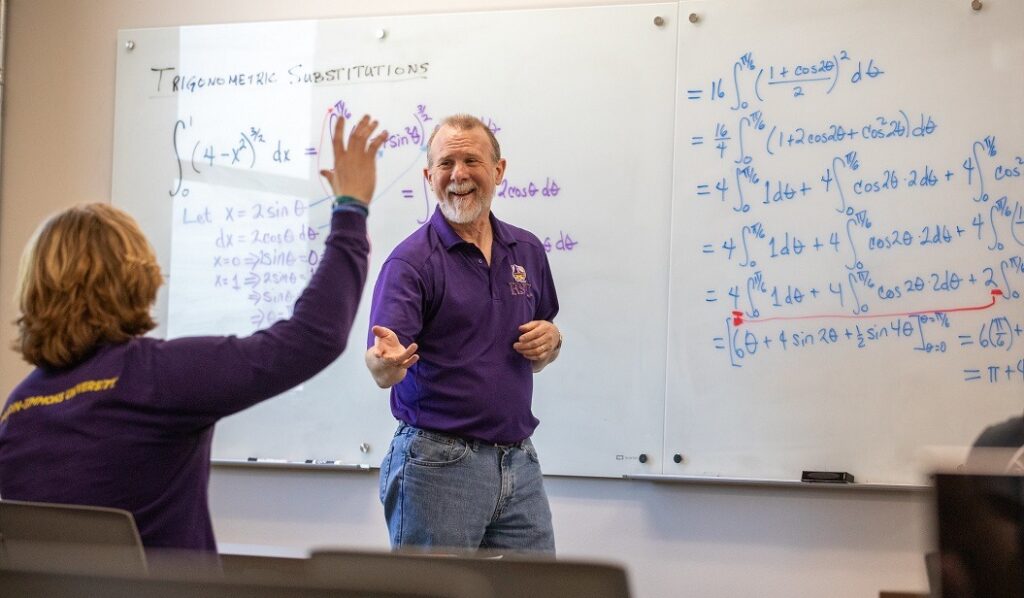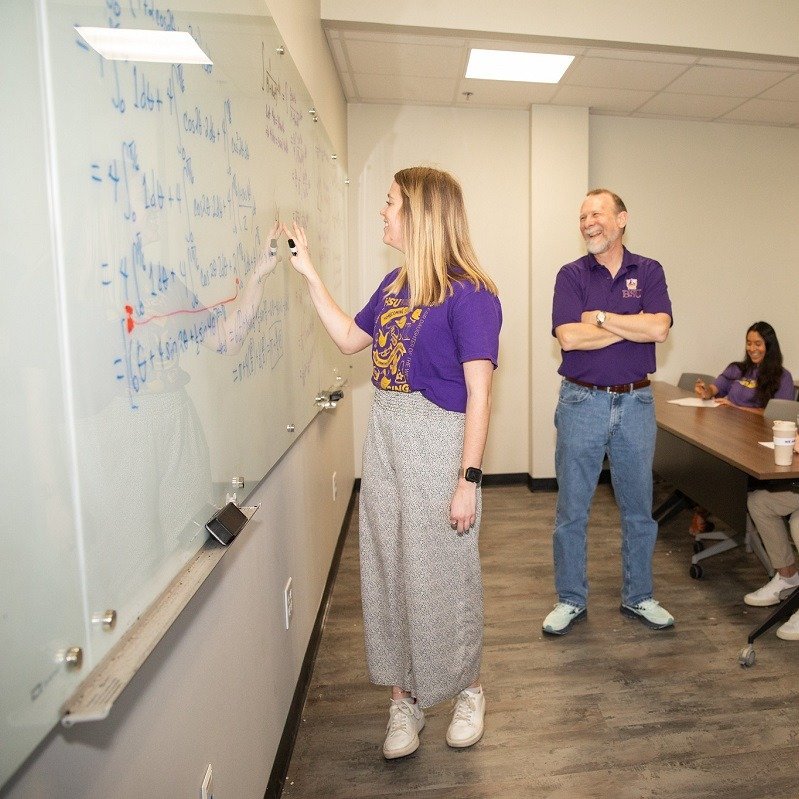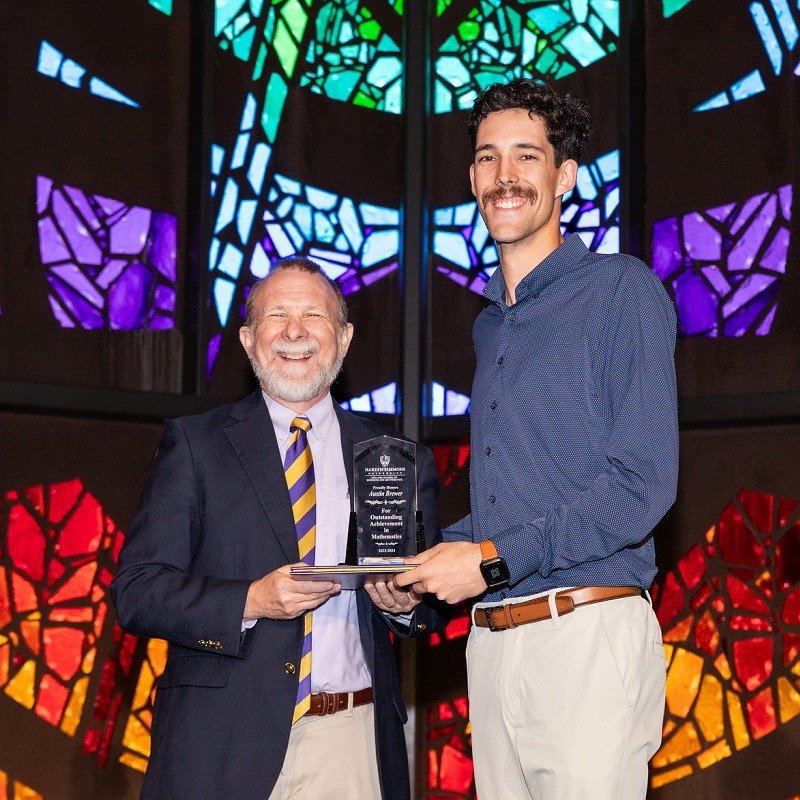Intro Block Section Instruction
Form Block Section
Write all of the introduction content below. Only use NON
FULL-WIDTH blocks.
Full-Width blocks can be inserted
outside of this block and will wrap around the form.
Use the custom HTML block below to embed your form.
Unlock your potential through the power of mathematics.
Mathematics isn’t just a subject; it’s a gateway to a multitude of exciting and rewarding possibilities. Whether you’re tackling real-world challenges, scientific inquiries, or complex puzzles, mathematics equips you with the timeless ability to break problems down, analyze them critically, and find innovative solutions.
Almost everything around us is driven by numbers — from the computers we use, to the cars we drive, to the stars above us. Though many people may not be aware of it, how we interact with and understand the world greatly relies on mathematics and skilled mathematicians.
Earning a mathematics degree from Hardin-Simmons University is the best way to join this centuries-old tradition of looking at the numbers behind the world. We offer several degrees in mathematics so you can tailor your educational experience to your professional goals. These include a Bachelor of Arts, Bachelor of Behavioral Science, and Bachelor of Science. As a mathematics major at HSU, you’ll be a part of a thriving community of peers, alumni, and experienced faculty, who share your passion for math and learning.
What You’ll Learn in the Mathematics Degree Program
As a mathematics major, you’ll build a solid foundation in understanding the history of mathematics, computer applications of math, abstract algebra, and physics. You’ll gain a greater appreciation for the simple and complex mathematics that make possible fields such as astronomy, game theory, and computer program design. You’ll also master the skills and knowledge to prepare you for a wide variety of jobs for a mathematics major, such as defense contractor, software developer, and risk management specialist, among many others.
If you’re interested in delving deep into mathematics and its practical applications, we offer two mathematics minors that complement nearly every field of study.
Why Earn Your Mathematics Degree at Hardin-Simmons?
Why Earn Your Mathematics Degree at Hardin-Simmons?
Extraordinary Career Preparation
We take great pride in the many successes of our mathematics majors. For example, 100% of our math degree graduates pass their teaching certification test within the first two attempts, and 100% of these graduates find careers teaching math in high schools or middle schools. In addition, 100% of math degree graduates who apply for graduate programs are accepted. Studying math at HSU means having the best chances of landing the job that’s right for you.
Exceptional Math Degree Faculty
Thanks to our small class sizes, you’ll receive individual attention and support from our world-class faculty. Each faculty member holds a Ph.D. in their field and has years of experience teaching and mentoring students. Our faculty also specialize in a diverse range of fields, such as astronomy, mathematics education, game theory and operations research.
Strong Mathematics Community
Being a mathematics major at HSU is about more than receiving a high-quality education. It’s also about joining a family of passionate mathematicians and math-lovers. We host several honor societies and social events for you to meet other mathematics majors and make lasting relationships.
Outcomes
We focus on preparing you for the top jobs for a mathematics major so you can find the career of your dreams. Thanks to the excellence of our rigorous program, our alumni are in high demand in organizations and graduate programs throughout Texas and the nation.
With a math degree, you’ll also enjoy the job security that comes with many jobs for a mathematics major. For instance, the Bureau of Labors Statistics (BLS) predicts that jobs for mathematicians and statisticians will grow 33% over the next decade, more than three times as fast as the average for other occupations.
How much can you make with a mathematics major?
According to the BLS, the average salary for mathematicians and statisticians is $75,000. Earning a master’s or doctoral degree can increase your salary even more.
Program Details
Click on plus button at the bottom of this Accordion BLOCK (not accordion tab) to create a new tab. Select Accordion TAB block to edit tab headline. Select nested blocks within accordion tab to edit content.
-
Mathematics Placement at Hardin-Simmons
At HSU we strive to place students in the correct mathematics class for their academic program and skill level. Placement in courses (not needed for MATH 1301) is accomplished in two ways:
- Minimum scores on the mathematics portions of either the ACT or SAT.
- Minimum scores on the ALEKS-PPL Mathematics Placement Exam.
ACT/SAT Mathematics
Course Minimum ACT Math Score Minimum SAT Math Score MATH 1305 18 510 MATH 1310 18 510 MATH 1311 20 530 MATH 1420 25 550 ALEKS-PPL
The ALEKS-PPL is administered by McGraw-Hill. The cost to the student is $20 which is paid thru the website (see below).
The student may take the placement exam up to five (5) times, with mandatory study time between attempts. After the first attempt, the student may access review materials through the website for no extra charge.
ALEKS Scores
Score Course Placement 45 or less MATH 0300 – Intermediate Algebra (if MATH 1305 or MATH 1310 is required) 46-60 MATH 1305 – Finite Mathematics for Business or MATH 1310 – College Algebra 61-75 MATH 1311 – Trigonometry 76 or more MATH 1420 – Calculus 1 If the academic program requires MATH 1301 – Aspects of Modern Mathematics, no placement is required.
How to sign up for the ALEKS -PPL
Go to www.aleks.com/login and create an account. HSU’s class code is: WXTDQ-KUNHM.
-
Which Math Class Do I Need?
The chart below displays programs requiring a minimum of MATH 1305, MATH 1310, or MATH 1420 (Calculus 1). Students admitted into the programs below and wanting to sign up for the ALEKS-PPL Mathematics Placement Exam please click here.
Questions about specific math courses, prerequisites, and the ALEKS placement exam are to be directed to the Department Head of Mathematics, Dr. Andrew Potter apotter@hsutx.edu
Program MATH 1305 MATH 1310 MATH 1420 Accounting Y Biochemistry & Molecular Biology Y Biology Y Chemistry Y Chemistry/Pre-Pharmacy Y Communication Sciences and Disorders Y Computer Science (BBS) Y Computer Science (BS) Y Economics (BBA) Y Economics (BS) Y Education – Elementary Y Education – Middle – General Science Y Education – Middle – Mathematics Y Education – Secondary – Life Science Y Education – Secondary – Mathematics Y Education – Secondary – Physical Science Y Education – Secondary – Science Y Engineering – Mechanical Y Exercise Science Y Finance Y Health Psychology Y Human Computer Interaction (BBA) Y Information Systems (BBA) Y Management (BBA) Y Marketing (BBA) Y Mathematics Y Music – Composition Y Music – Performance Y Music – Worship Leadership Y Nursing – BSN Y Nursing – RN to BSN Y Physical Science Y Pre-Athletic Training -EXSC Track Y Pre-Dental Y Pre-Medical Y Pre-Physical Therapy – Biology Track Y Pre-Physical Therapy – EXSC Track Y Pre-Physician Assistant Y Pre-Veterinary Y Social Work & Psychology Y Wildlife Certification Y In addition to MATH 1310, the BS (Bachelor of Science) degree requires another three hours of mathematics. This is usually MATH 1311 – Trigonometry. MATH 1310 and MATH 1311 cannot be taken in the same semester.
-
Scholarships and Awards for Mathematics Majors
Hardin-Simmons University is committed to helping mathematics majors pay for their college education. We’ve been blessed with generous donors and alumni who make it possible for us to offer several scholarships exclusively for mathematics majors. You may also be eligible for university-wide financial aid. Learn more about scholarships at Hardin-Simmons University.



